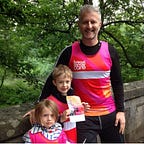Data, sport, the Imps and Nigel Farage — the journey and the destination of George Willoughby
With his journalism undergraduate degree at Cardiff behind him, and a new city and postgraduate data journalism course ahead of him, it’s hard not to be swept up in the enthusiasm of George Willoughby
Twenty-one year old data journalist George Willoughby doesn’t even try to hide his excitement. As he considers the road ahead of him, the M.A. course, the opportunities and the drive to learn, it’s written on his face and in his constant, restless fizzing motion threatening to burst through the screen of our Google Meet call.
“That’s the appeal of data journalism,” he says, explaining why in an age of ‘alternative facts’ he’s pursuing this particular career. “You can explain facts, show trends, reveal the truth.”
Isn’t he worried about people’s level of trust in journalists?
“Why not prove them wrong? And prove you can be trustworthy?
“When you do the research about the career you’re told that ‘journalists can make a difference’ but when you actually do that in person that’s when I knew that’s what I wanted to do.”
His enthusiasm is contagious. Not least because of the contrast between interviewer and interviewee. On one side of the screen is a journalist at the start of his editorial adventures while on the other someone whose career in newspapers was started two years before the subject was even born, and who is quite literally “going back to school”.
“I got a real buzz from putting some thoughts, some words on to paper”
It would be facile to speak of cynical old hack versus youthful naivety, but this is not that story. Instead, this is the tale of conviction in the power of data to tell stories that matter.
It started with a conversation with a teacher during his A Levels which led to his first pieces of journalism.
“I started writing my first pieces and got a real buzz. I started writing about Donald Trump who had just been elected, and Nigel Farage.
“I got a real buzz from putting some thoughts, some words on to paper.”
“I’ve improved a lot since then. But that’s where it started. That was the second bit of writing I ever did. I was pretty proud of it and thought it was an interesting take on a topic others had disregarded.”
Despite being brought up outside of Manchester, his father’s love for all things Lincoln Town FC was passed on to his son (“brainwashing from an early age”) and soon a football blog on the “Imps” followed.
“My love for writing then just grew and that set the base layer for me wanting to go into the industry,” he says.
“It was my first experience in a newsroom. I loved it — being part of the working environment.”
He typifies this generation of entrepreneurial journalists — setting up a football fan site, writing for other sport sites too, securing work experience himself at Media Wales in Cardiff so he could learn from Claire Miller, head of data journalism at Reach.
“It was a big eye opener. Seeing Claire and the others work, the way they could manipulate data to select the most accurate, the best way to explain something.
“Claire really explained to me what to look for, what I have to question, how to identify trends, do the analysis.
“It was my first experience in a newsroom. I loved it — being part of the working environment. I enjoyed spending time working on stories and then producing something that was up to the standard Claire and the others were looking for. And then on to the next one.”
His portfolio of work showcases his range of interest, and his love of sport and its intersection with data.
“I see data with sport and there are things you can piece together. What you see is the bit underneath — why is a certain player performing well or not?”
“It may not be a straight line but I’ll get there”
But his ambitions are not confined to sports data journalism.
“Although I do love sport and writing about the data side of it I want to branch out and do more than that. I didn’t want to limit myself.
“I knew if I wanted to take my journalism to the next level I had to come here [to Birmingham].”
Sat in his new shared flat in Birmingham, in the midst of a global pandemic and with a certain level of uncertainty still swirling around how the course is going to unfold, even in practical terms such as timetables, how does he feel about the future?
“You can name any emotion and I’m probably feeling it. Nervous. Excited. Mainly excitement.
“I can’t tell where I’ll be at the end of this course. I’m driven in that I want to get to where I want to get to. It may not be a straight line but I’ll get there.”
